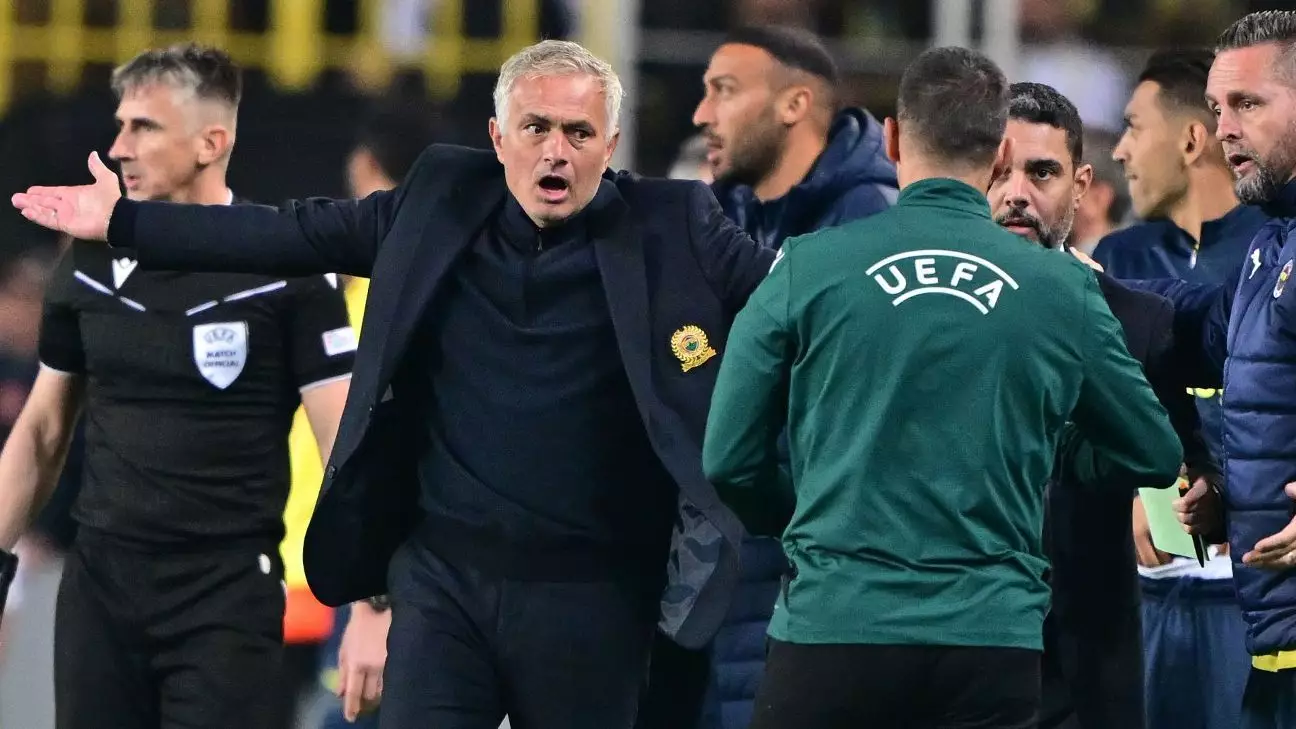Jose Mourinho, the renowned football manager now leading Fenerbahce, has recently voiced his frustrations regarding the perceived uneven treatment he has received from UEFA. His remarks came in the wake of punitive measures stemming from his behavior during the 2023 Europa League final, where his team, Roma, suffered a heart-wrenching defeat to Sevilla. This article explores Mourinho’s concerns, his reflections on his career, and the broader implications of his statements.
Mourinho’s tenure at Roma was marred by controversy after the Europa League final in Budapest, where an emotionally charged match concluded in a penalty shootout. Following the defeat, Mourinho engaged in a verbal tirade against referee Anthony Taylor, leading UEFA to impose a four-match touchline ban on him. Mourinho’s belief that he is under scrutiny only because of this incident is striking; he feels that something has shifted in how he is treated compared to his peers. “The feeling is, I am in trouble in Europe,” he stated, indicating that the pressure he experiences is not solely due to his actions, but also a perceived bias from footballing authorities.
Mourinho’s insistence on wanting “honest treatment” rather than special treatment harkens back to his long-held views about fairness in football. His comments underline a critical debate regarding accountability and consistency in officiating, not just for players but for managers too. The enforcement of rules should ideally be uniform, regardless of a coach’s illustrious background or past achievements. Mourinho’s call for equanimity brings to light the challenges faced by high-profile managers in high-stakes matches.
The recent Europa League clash between Fenerbahce and Manchester United saw Mourinho receiving a straight red card after an impassioned confrontation with the officiating team. Following a penalty appeal from his side, Mourinho’s frustration boiled over, resulting in his ejection from the match. The incident underscores not only his passionate demeanor but also raises questions about the pressures placed on managers in critical matches. The juxtaposition of Mourinho’s reaction with his assertions about equitable treatment further emphasizes the emotional toll tied to high-stakes encounters.
Despite his persistent grievances with UEFA, Mourinho highlighted his belief that every coach, regardless of stature, should be held to the same standards. He mentioned notable figures in football, from Lionel Messi to coaching novices, emphasizing that the rules of the game should not favor the experience or reputations of some over others. His insistence on uniformity reflects a more profound issue within sports regarding bias and fairness, prompting the question: how can governing bodies ensure a level playing field for all involved?
In light of his ongoing frustrations, Mourinho has mused about his future, suggesting that his next managerial role may be away from UEFA competitions, specifically within the English football system. This remark, however, was later clarified as an offhand comment. Despite indicating a reluctance to manage teams fighting relegation, Mourinho expressed a desire to return to the Premier League eventually, though he remained firm that he would not do so for a few years.
The decision to step away from high-pressure European stages reflects a need for self-preservation amid the emotional challenges that accompany his position. He noted the profound impact relegation struggles have on individuals involved—an acknowledgment of the gravitas associated with managing teams battling for survival. This perspective not only humanizes Mourinho but also sheds light on the emotional complexities tied to football management.
As he navigates the intricate landscape of football management, Mourinho’s longing to return to London speaks volumes about his connection to the game and the life experiences that have shaped him. He recognizes the challenges ahead but wishes to bring joy back into his career. Mourinho’s reflection on his path forward, combined with his plea for fair treatment, resonates with many in the sporting world.
Jose Mourinho’s grievances with UEFA illuminate much more than individual frustrations; they reflect broader issues of fairness, accountability, and the emotional resilience needed in football management today. As he seeks to carve out a more fulfilling chapter with Fenerbahce, the football community will undoubtedly be watching to see how his journey unfolds.

